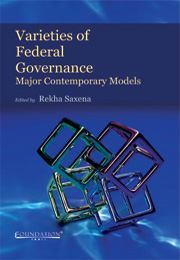Book contents
- Frontmatter
- Contents
- List of Contributors
- Foreword
- Acknowledgements
- Introduction
- I Theoretical and Comparative Dimensions
- II Presidential Federal Systems
- 3 Political Coercion and Administrative Cooperation in U.S. Intergovernmental Relations
- 4 What Makes the Swiss Multicultural Federalism Work
- 5 Local Governments in the Brazilian Federation
- 6 Russian Federalism: Does it Work?
- 7 Federalism in Pakistan
- III Commonwealth Parliamentary Federations
- IV Non-Commonwealth Parliamentary Federations in Afro-Asia
- V European Parliamentary Federations
- VI Devolutionary Systems
- VII Supranational Confederalism/Federalism?
4 - What Makes the Swiss Multicultural Federalism Work
from II - Presidential Federal Systems
Published online by Cambridge University Press: 05 June 2012
- Frontmatter
- Contents
- List of Contributors
- Foreword
- Acknowledgements
- Introduction
- I Theoretical and Comparative Dimensions
- II Presidential Federal Systems
- 3 Political Coercion and Administrative Cooperation in U.S. Intergovernmental Relations
- 4 What Makes the Swiss Multicultural Federalism Work
- 5 Local Governments in the Brazilian Federation
- 6 Russian Federalism: Does it Work?
- 7 Federalism in Pakistan
- III Commonwealth Parliamentary Federations
- IV Non-Commonwealth Parliamentary Federations in Afro-Asia
- V European Parliamentary Federations
- VI Devolutionary Systems
- VII Supranational Confederalism/Federalism?
Summary
Introduction: Mapping Paradoxes and Challenges
Let us formulate the following with a hypotheses:
A major issue for any multicultural federalism is how to democratically reconcile cultural and political/modern pluralism. The consensus underlying multicultural federalism cannot be (only) that of majoritarian democracy since minority usually does not see itself as a part of the state nationhood. The question, whose is the state, thus becomes critically important.
A major challenge of any multicultural federalism is not to radicalise the problems to which federalism was supposed to be a solution! This has often been the case, just to remind of the ex-communist multiethnic federations that dissolved after the fall of communism.
A major paradox is a low level of legitimacy due to the lack of trust and tolerance. The major paradox of multicultural federalism lies in the fact that it should create trust and tolerance, which in fact are its own preconditions! Indeed, multicultural federalism can work only if it succeeds in democratically commanding a loyalty that would transcend cultural cleavages, i.e., if it democratically reconciles cultural and political pluralism. This become especially clear in the cases where federal design of some kind is expected to mitigate ethnic, religious or cultural cleavages as a part of conflict transformation strategy in state building and nation making processes, including the role that the international community.
One can now turn to the Swiss model of multiculturalism and understand the reasons that make this model successfully work.
- Type
- Chapter
- Information
- Varieties of Federal GovernanceMajor Contemporary Models, pp. 54 - 68Publisher: Foundation BooksPrint publication year: 2011



